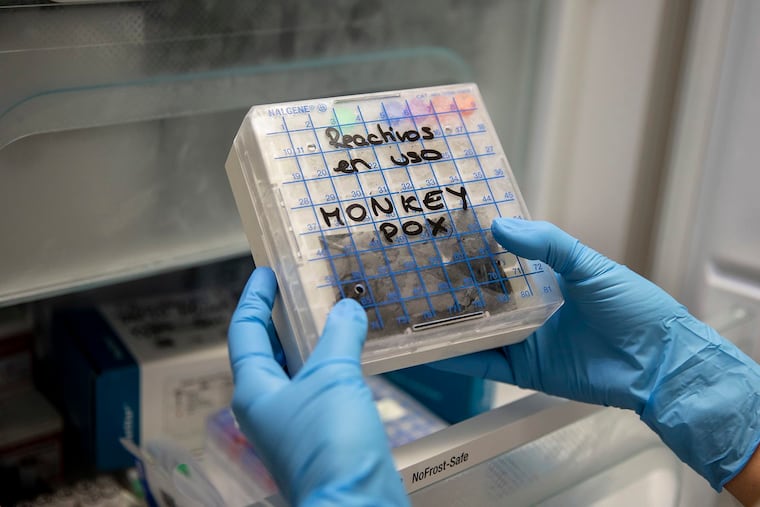Philly’s monkeypox vaccine shortages aren’t solved yet as feds make move to increase access to the shots
A shift in policy that allows health care providers to offer smaller doses of monkeypox vaccine won't immediately solve the vaccine shortage locally.

Federal authorities are permitting health providers to administer much smaller doses of monkeypox vaccine to stretch the limited supply of the shots, but the Philadelphia Public Health Department is holding off on committing to the new approach, saying it wants more information.
The Food and Drug Administration on Wednesday issued an emergency use authorization that increases the availability of vaccine fivefold by shrinking the amount administered with each dose. The new rules are in response to an increase in new cases that outpaces vaccine supply. Monkeypox cases in the United States topped 9,000 this week, up from 40 two months ago. In Philadelphia, providers are keeping waiting lists of people seeking doses, and a health department hotline to direct people to vaccines has been swamped with calls.
» READ MORE: U.S. will stretch monkeypox vaccine supply with smaller doses
The city health department, though, wants more information before committing to the smaller doses. Philadelphia health officials said the FDA update leaves unanswered questions about the safety and efficacy of the smaller doses, and doesn’t specify whether patients can choose between the original vaccine amount or smaller doses.
“While we continue to work to ensure that as many at risk Philadelphians are protected as possible while we wait for those answers, the Health Department is beginning to plan for implementation of this new vaccine strategy, if it’s required,” the department said in its statement.
In an interview last week, Philadelphia Health Commissioner Cheryl Bettigole estimated the city could use at least double the approximately 5,000 doses it has been shipped so far to cover people at high risk from the virus.
The Pennsylvania Department of Health said in a statement Wednesday that access to intradermal injections may depend on the provider.
“While there are providers prepared to begin administering intradermal injections right away, other providers will need additional supplies, training or technical assistance,” a department spokesperson said.
The New Jersey Department of Health credited the FDA’s decision Tuesday with expanding vaccine access.
“The state health department is working with vaccine providers to be able to implement the new recommendations as soon as they are able,” a statement from the department said.
» READ MORE: Monkeypox vaccine limits cause frustration and fear in Philly
The FDA announcement changes not just dose amounts but how they’re injected. Monkeypox shots have been administered subcutaneously, into the fatty tissue beneath the skin. The smaller doses approved by the FDA would be given intradermally, directly into the patient’s skin. The same dose amount that has been administered to one person can now be expanded to five while providing for each a similar immune response, the FDA reported in a statement Tuesday, citing a 2015 study that evaluated both kinds of injections.
Switching to smaller doses isn’t something that can be done immediately, though, because the approach requires more precision, said Jay Kostman, a doctor at Philadelphia FIGHT, a city health center focused on LGBTQ patients.
“I think it’s going to require training for the people who administer the vaccine because people aren’t used to doing intradermal vaccines,” he said. “If you don’t do it right and you do it with a smaller dose, you’re less likely to get the immune benefit.”
» READ MORE: Exposed to monkeypox? Here’s how to get a vaccination appointment in Philly.
Philadelphia FIGHT has been going through doses quickly, Kostman said. The health center went through its initial shipment of 100 doses, he said, with people left on the waiting list. Those people are getting vaccinated now with another shipment received this week.
The decision to allow smaller doses was prompted by case counts that continue to outstrip the availability of vaccine doses.
“In recent weeks the monkeypox virus has continued to spread at a rate that has made it clear our current vaccine supply will not meet the current demand,” said FDA Commissioner Robert M. Califf in a statement Tuesday. “By increasing the number of available doses, more individuals who want to be vaccinated against monkeypox will now have the opportunity to do so.”
So far, the federal Department of Health and Human Services has shipped almost 618,000 doses of vaccine, with 11,329 going to New Jersey, 10,311 to Pennsylvania, and 4,790 to Philadelphia, with a small number of additional doses coming to the city through the state Health Department. Pennsylvania reported 251 cases as of Tuesday, according to the Centers for Disease Control and Prevention, and New Jersey reported 251.
Monkeypox is typically not fatal but causes painful rashes and lesions that can last up to a month. Extended physical contact with those blemishes, which at some stages of the virus are barely noticeable, is the most common mode of transmission, and sex has proven to be particularly effective at spreading it, though the virus does not require sexual contact to infect a person.
The virus is overwhelmingly infecting men who have sex with men, and health officials have said men who have recently had multiple sex partners or anonymous sex are at the highest risk of infection. There hasn’t been enough vaccine to reach that entire population, though. Other groups, including health-care workers who treat people with monkeypox and sex workers, are not yet eligible for doses.
Even among those who are eligible, many can’t get the shot. Health officials have had to prioritize vaccinating people who have already been exposed to the virus. If the shot is given quickly after exposure, the vaccine does a good job of preventing the person from getting sick, but focusing only on those who have already been exposed isn’t a strategy that will contain the virus, health experts have said.